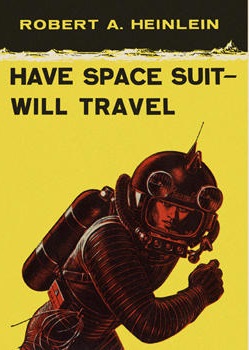I read this book a long time ago when I was a little kid, and I don't intend to reread it just to write a more up to date review. It's not really the kind of book that requires a great deal of introspection, not to say it isn't good, so I don't feel bad about saying I'm going to give my impression of the novel looking back fifteen years at it.
This is one of the books that comes into my head when I think “Classic” SF, aimed at a young audience, not overly concerned with getting the science straight, what science it does get right is thrown off by being sixty years out of date, fun to read. No editor today would publish this type of book, but I’m really glad that it’s out there.
I read this book when I was a teenager, and that’s really the sort of audience it’s aimed at. Heinlein had definite stylistic periods in his writing which are actually very clearly delineated. He got his start publishing YA stories for magazines with very dated titles, I can’t think of any now but I assure you they were something like ‘Boys Life’ or ‘Science Weekly (This novel was actually published in 'The Magazine of Fantasy and Science Fiction).’ When Heinlein published ‘Starship Troopers’ all that changed. His editors felt like it wasn’t a book appropriate for kids and asked him to change it. When he didn’t he moved on to the next phase. Later he moved on publish ‘Stranger in a Strange Land’ and ‘The Moon is a Harsh Mistress,’ I’d call this his high point. Toward the end of his career Heinlein moved on to publish ‘Time Enough for Love’ and ‘Friday.’ These are good enough books, different from Heinlein’s high point, though they probably suffer most by comparison to his previous work. This final stage contains a lot of rambling, almost plot-less novels that just sort of meander around and get into a lot of slightly creepy sexual situations.
The period when Spacesuit was published comes from that earliest period. It’s a YA novel about a kid that buys a spacesuit on the cheap at auction and wears it around for no reason. The day before the kid has to sell it a spaceship just happens to wander by and take the kid on a wild adventure through space. Heinlein fills the novel with a bunch of wild ideas, I remember there was a green monkey who communicated by dancing and doing flips, and the subject Heinlein had him communicate about was how civilized he was so that was kind of interesting.
In modern literature there are clearly defined roles for what SF is and is not, I don’t necessarily agree with it but you can almost see the Hugo nominees from a mile away. There isn’t any way that a book like this could get published now any more than a book like 'A Princess of Mars' could. 1950s SF was full of books aimed at young kids about space and aliens in an almost wholesome fashion. While the children involved with these sort of stories might be involved in danger it was more of the Saturday morning cartoon variety than the 'Hunger Games' sort. A lot of reviews for this novel actually criticize it for being too heavy on math for young kids, which I think is ridiculous. Kids love math.
For me this book gets classified with a lot of other pulp SF from the '50s and earlier. It's a good example of what the genre was about and where it was heading. It shows some of genre's roots in the sort of space adventure, alien punching, that you expect when you think classic SF. Also the novel had a strong female protagonist that didn't take a back seat to a man or become a damsel in distress, always a plus in my book and especially admirable considering when the book was written.

No comments:
Post a Comment